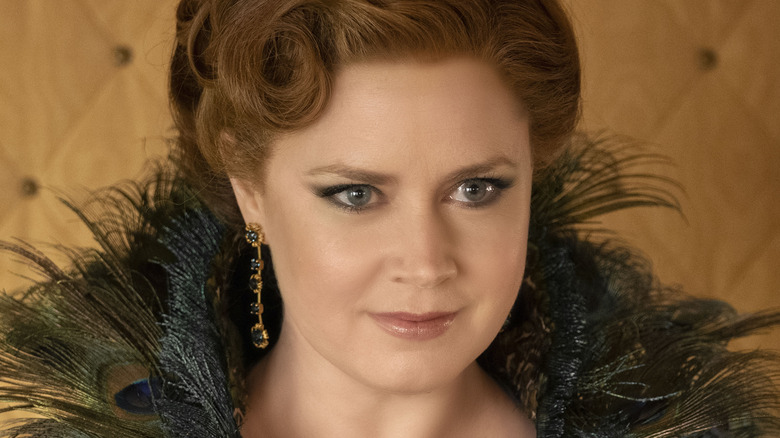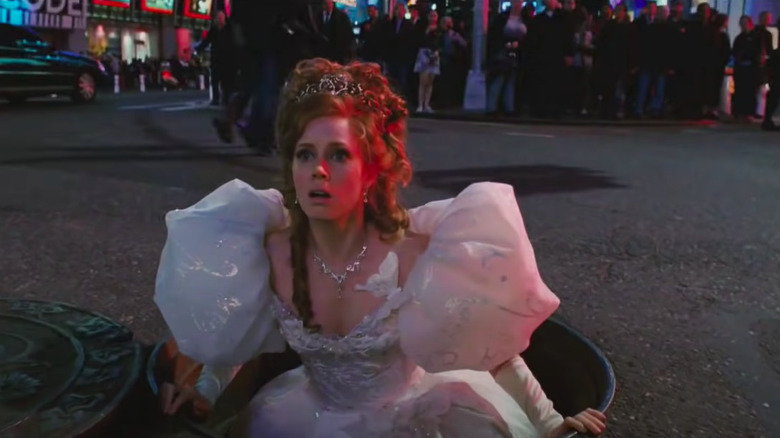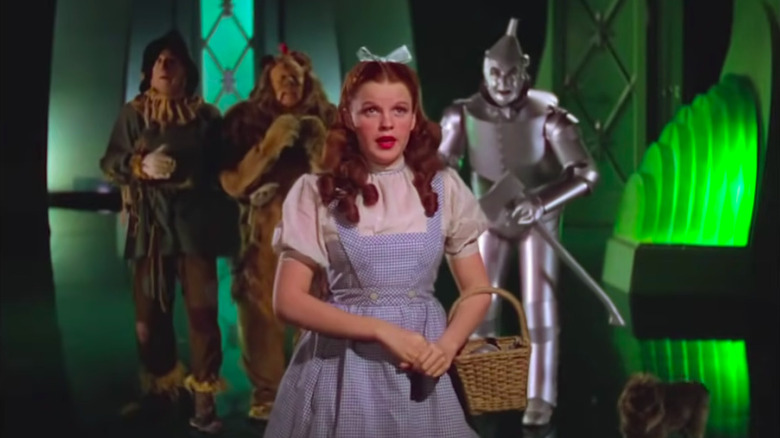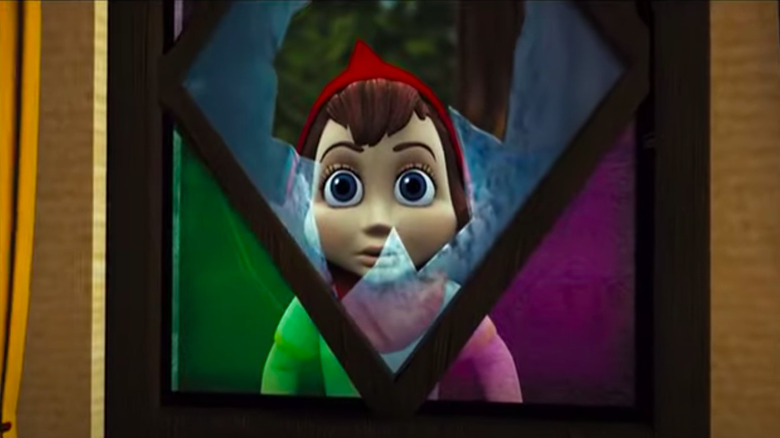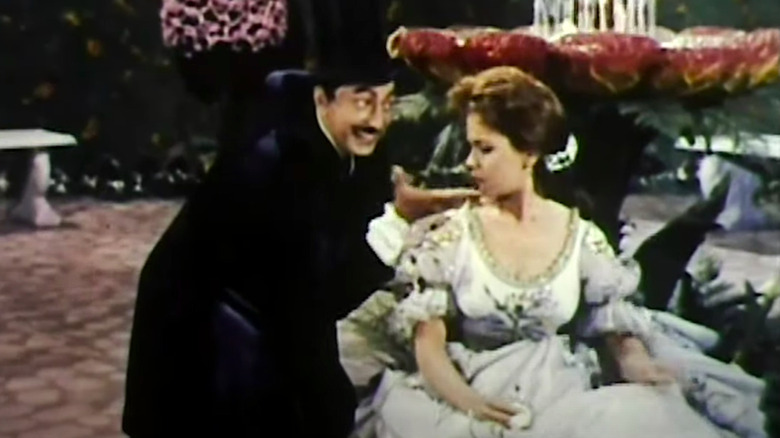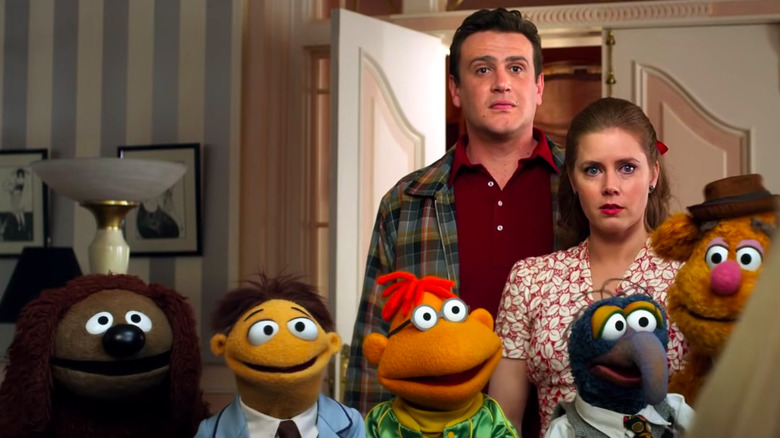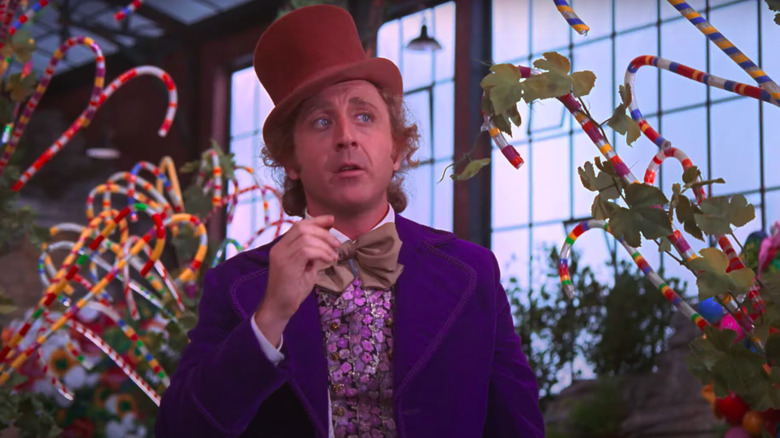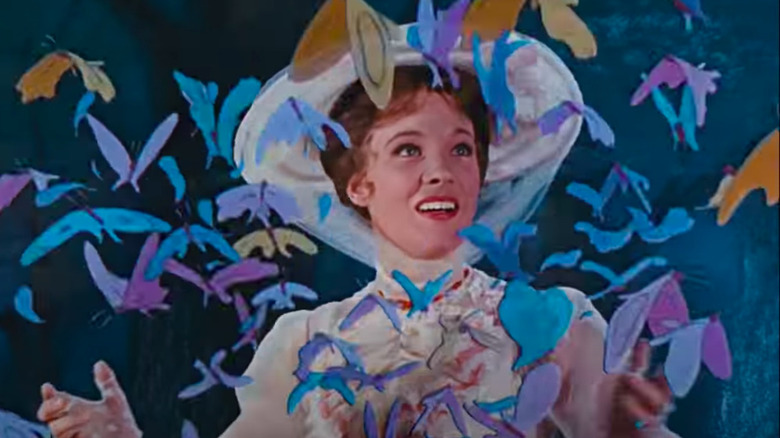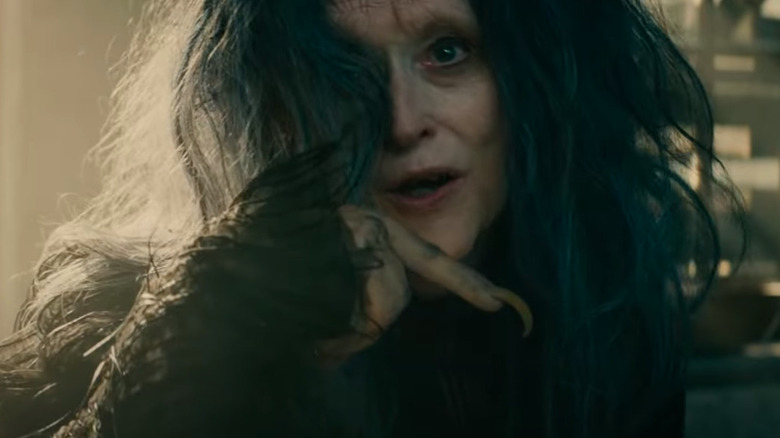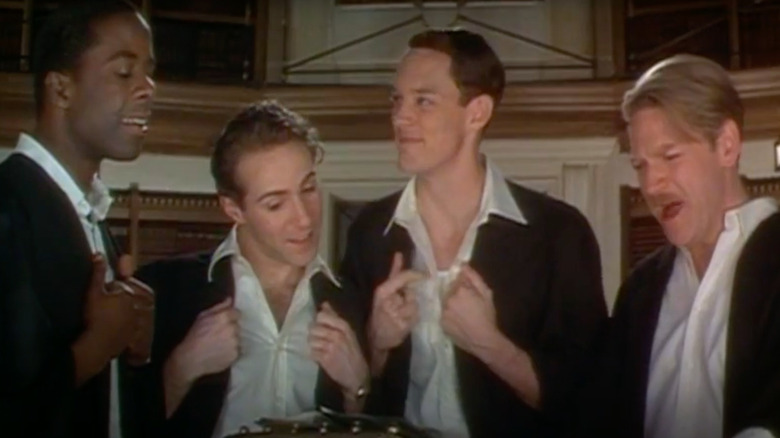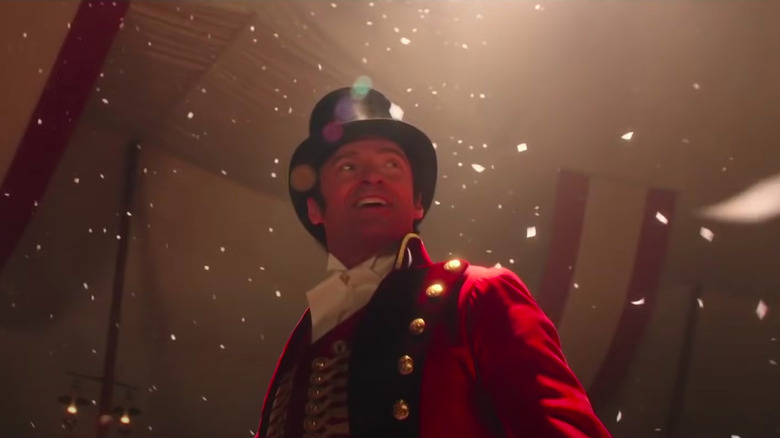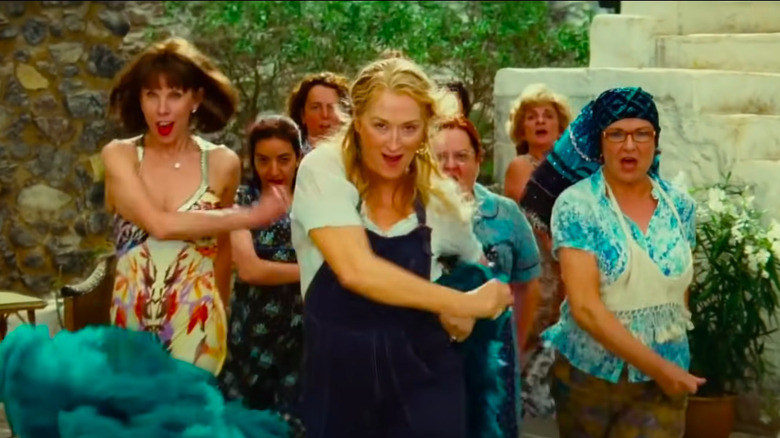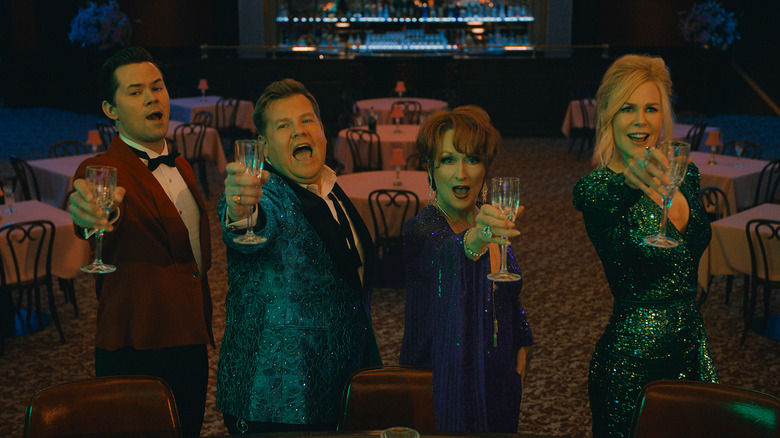12 Magical Musicals Like Disenchanted Fans Should Watch Next
There are few Hollywood establishments more synonymous with musicals than Disney's animated fairytales. Ever since Snow White warbled her initial notes in America's very first full-length animated feature "Snow White and the Seven Dwarfs" in 1937, songs have been an integral part of these family-friendly films. So when "Enchanted" was released in 2007, it was no surprise that Disney's self-parody of its own animated princess tales was a musical too. In fact, the movie includes several songs, including "Happy Working Song" and "That's How You Know," that cleverly satirize fairy-tale tropes while establishing themselves as catchy, sing-along-worthy ditties in their own right.
The same is true of "Disenchanted," the movie's long-awaited sequel, and because the plot of the follow-up revolves around a wish that changes the real world into a fairy tale, the film is packed with even more catchy tunes and memorable melodies than its predecessor. From the dueling villain duet "Badder" between Amy Adams' Gisele and Maya Rudolph's Malvina to the classic "I want" ballad "Perfect," brought to life by Gabriella Baldacchino's Morgan, the songs make the magical story even more captivating. After taking in "Disenchanted," you may be compelled to watch one (or all) of the classic Disney animated musicals that inspired the film, but we're offering 12 alternative options here that will scratch that same itch for more melodic entertainment.
Enchanted (2007)
If you caught "Disenchanted" on Disney+ but missed the first movie, correct that oversight as soon as possible. While "Disenchanted" includes a prologue that makes it possible to follow the new movie without seeing its predecessor, there's really no substitute for taking in the original film in all its glory. "Enchanted" established Amy Adams as the star we know her as today, and it's easy to see why. In someone else's hands, Gisele could have been cloying, but Adams brings a knowing innocence to her fairy-tale character. While Gisele's naïve to the ways of the (real) world, she's never weak or uncertain while always being willing to learn and grow, making her surprisingly compelling and even aspirational.
In many ways, "Enchanted" is built like a classic opposites attract rom-com, as Gisele meets lawyer and single dad Robert (Patrick Dempsey) and eventually falls in love with him, even though the pair don't get along at first. What sets the movie apart, though, is how it manages to find the perfect balance between satire and genuine appreciation for the Disney movies it references. Plus, many of the movie's songs are so catchy you may find yourself enthusiastically humming them even days later.
The Wizard of Oz (1939)
Dorothy (Judy Garland) from "The Wizard of Oz" and Gisele from "Disenchanted" have a lot in common. Both maintain a sincere attitude and hopeful perspective in the face of difficulty, even though the challenges of life sometimes get the better of them. And both have a habit of winning over others with their innocent ways and belief in everyone's basic goodness, whether they're choosing to put their faith in a cowardly lion or the self-styled queen of a suburban town. Moreover, the troubles of the real world leave them both wishing for a care-free fairy-tale life, a desire so relatable that it's turned Dorothy's song "Somewhere Over the Rainbow" into a classic.
Of course, the land that Dorothy travels to in "The Wizard of Oz" isn't based in fairytale stories like the one Gisele's wish conjures, even though it's still every bit as mystical. Based on L. Frank Baum's novel, the movie version of the Land of Oz is fraught with obstacles from the moment a tornado drops Dorothy and her house there, including the very angry, extremely vindictive Wicked Witch of the West (Margaret Hamilton) and the long road to the wizard who can grant Dorothy's wish to return home to the family she loves. "The Wizard of Oz" casts such a spell on audiences that it remains a must-see decades after its release.
Hoodwinked (2005)
"Hoodwinked" is a fairyale satire like "Disenchanted," but this "Rashomon"-style animated musical re-telling of "Little Red Riding Hood" is a bit edgier than the continuation of Gisele's story. The movie starts in the aftermath of Red (Anne Hathaway) and Granny's (Glenn Close) unfortunate encounter with the Wolf (Patrick Warburton), as the police arrive to assess what has happened, leading to a story that filters a familiar tale through a gritty crime-drama lens. Yet, unlike the "Shrek" movies it's often compared to, "Hoodwinked" is a lot less cynical, while managing to be equally hilarious and clever by pulling its humor from unexpected revelations about a group of characters viewers think they know, and the differences between what the story's situations look like and what's actually going on.
Plus, "Hoodwinked" features a fantastic cast. In addition to Hathaway, Close, and Warburton, voices are also supplied by Anthony Anderson, Jim Belushi, David Ogden Stiers, and Tara Strong, the voice of Miss Minutes from the Marvel Cinematic Universe series "Loki." The one caveat is that the film's animation doesn't reach the same level of quality that audiences are used to from Disney, Dreamworks, or Illumination, so in comparison to the animation in "Disenchanted," "Hoodwinked" looks crude. That said, the film is so charming you may find yourself having too much fun to care, especially during songs like the Woodsman's (Belushi) ode to a special snack, "The Schnitzel Song," and "Be Prepared," a helpful mountain goat's advise to Red as he escorts her on a madcap journey to Granny's house.
Babes in Toyland (1961)
Based on the 1903 operetta of the same name, "Babes in Toyland" takes place in a land inhabited by nursery rhyme characters, including Bo Peep (Ann Jilliann), Mother Goose (Mary McCarty), and Boy Blue (Kevin Corcoran). When the story begins, everyone is eagerly awaiting the wedding of Mary Contrary (Annette Funicello) and Tom Piper (Tommy Sands), except for Barnaby (Ray Bolger), a mustache-twirling villain who enlists Gonzorgo (Henry Calvin) and Roderigo (Gene Sheldon) in a scheme to kill Tom and steal Mary's sheep, all to force Mary to marry Barnaby so he can claim the sizable inheritance Mary doesn't know she's entitled to.
The plan doesn't work, but when Bo Peep ventures into the Forest of No Return after the lost sheep, Mary and Tom follow and are brought to the Toymaker (Ed Wynn) in Toyland. Meanwhile, Barnaby's hot on their heels and still determined to wed Mary. The film is designed to charm young children, though it's not without some dated sentiments. Parents may want to skip a few key songs to avoid the worst moments, especially "I Can't Do the Sum," in which Mary frets about her inability to do math, and "Just a Toy," in which Tom suggests that Mary is nothing more than a plaything made just for him.
Nonetheless, "Babes in Toyland" has some mesmerizing moments. Children will likely be especially dazzled by the toys in Toyland, which come to life to battle Barnaby. Plus, adults who enjoyed the way Gisele and Malvina revel in their wicked ways in "Disenchanted" will be amused by Barnaby and his henchmen's songs, including "We Won't Be Happy Till We Get It" and "Slowly He Sank to the Bottom of the Sea."
The Muppets (2011)
If you loved Amy Adams' singing in "Disenchanted," you'll appreciate hearing her exercise her vocal chops again in "The Muppets." In the movie, Adams plays Mary, a teacher who's eager for her longtime boyfriend Gary (Jason Segel) to put a ring on it, even though he's too preoccupied with his brother Walter (who was born a Muppet) to notice. When the trio take a vacation to Los Angeles and learn that the Muppet Theater, the home of the original "Muppet Show," is going to be sold and destroyed, they recruit the Muppets to stage a telethon to save the building. In the process, Gary and Walter each come to terms with their identities as a man and a Muppet, respectively.
The Muppets are always endearing, but not every attempt to reboot or revisit them and their zany but heartfelt brand of humor has always gotten it right. This movie recaptures their particular magic, though, with a combination of nods to Muppets history and the introduction of new characters who push the franchise into the future. Plus, the movie uses plenty of clever tunes (courtesy of Flight of the Conchords' Bret McKenzie) to bring its story to life, most notably the ballad "Man or Muppet," which won an Oscar for Best Original Song.
Willy Wonka and the Chocolate Factory (1971)
The musical fantasy favorite "Willy Wonka and the Chocolate Factory" may be aimed at children, but the film is such a singularly odd morality play that many adults will appreciate it just as much, if not more. Based on the novel "Charlie and the Chocolate Factory" by Roald Dahl, the story focuses of Charlie Bucket (Peter Ostrum), a poor boy who uses some change he finds on the street to buy a chocolate bar made by the famed but reclusive candy purveyor Willy Wonka (Gene Wilder). Wonka has hidden five Golden Tickets in random bars that will grant those who find them a tour of his factory, and Charlie happens to discover the fifth one. He, along with his chaperone Grandpa Joe (Jack Albertson), attend the tour with the other winners, a group of spoiled and obnoxious children who, due to their questionable actions, are each eliminated from the outing in surprising ways.
The movie's never shy about letting its freak flag fly, especially when the eccentric Wonka and his workforce, the diminutive Oompa-Loompas, are on screen. The chocolate factory setting, particularly the evocative centerpiece set of a candy-filled park with a chocolate river flowing through it, is as exciting for viewers to witness as it is for the characters. The Oompa-Loompas' regular songs about the flaws of each of the young tour participants are an amusingly off-kilter delight. Meanwhile, Wilder's sensational performance of "Pure Imagination" is equal parts enchanting and unnerving. This combination makes for a mesmerizing film that "Disenchanted" fans are likely to find intriguing.
Mary Poppins (1964)
"Mary Poppins" is one of Disney's most decorated live-action musicals, garnering Oscar wins for Julie Andrews for her performance as the title character and Best Original Song for the ditty "Chim Chim Cher-ee." The story of a nanny that literally falls from the clouds to arrive at the front door of 17 Cherry Tree Lane to look after the Banks children Jane (Karen Dotrice) and Michael (Matthew Garber), the "practically perfect in every way" Mary Poppins is a magical presence who becomes the healing force the Banks family needs. Making the movie especially memorable are the songs and scenarios that illustrate just how exceptional Mary is, from "A Spoonful of Sugar" to "Supercalifragilisticexpialidocious," which help convey the wonder and excitement of being in the character's presence.
"Mary Poppins" parallels "Disenchanted" in a striking number of ways. Most notably, both films combine animation and live-action to enhance their imaginative stories. Plus, much like Mary Poppins, Gisele suddenly appears in reality and must cope with the daily grind of chores and responsibilities, even if Mary seems much wiser to the ways of the world than Gisele does. Most importantly, like "Disenchanted," "Mary Poppins" is a film the whole family can enjoy together.
Into the Woods (2014)
Fans of "Disenchanted" will get a feeling of deja vu while watching "Into the Woods," an adaptation of the 1986 Broadway musical of the same name. That's because both start from the same premise: what happens to fairytale characters after happily ever after?
The kaleidoscopic story centers on the Baker (James Corden) and his wife (Emily Blunt), whose desire for a child lead them to make a deal with the Witch (Meryl Streep) who cursed them with childlessness. Their agreement brings them in contact with characters like Cinderella (Anna Kendrick), Rapunzel (MacKenzie Mauzy), and Little Red Riding Hood (Lilla Crawford). By the middle of the movie, each character has gotten exactly what they wanted, only to discover that their happy endings don't stay that way for long, as their earlier actions lead to terrible consequences.
Although the first half of "Into the Woods" is often amusing with its numerous nods to familiar fairytale story beats, the second half gets a lot darker as it contends with the outsized problems that ruin the characters' happiness. Still, the strong performances and especially the often stirring and sometimes amusing songs by legendary songwriter Stephen Sondheim ensure the film feels like an immersive visit to a fully realized fairytale world.
Love's Labour's Lost (2000)
If you loved the liberal use of familiar pop-culture touchstones in "Disenchanted," but wish there was some iambic pentameter thrown in, "Love's Labour's Lost" is for you. An unexpected take on the Shakespeare comedy — in which the King of Navarre (Alessandro Nivola) and his three courtiers (Kenneth Branagh, Matthew Lillard, Adrian Lester) swear off love for three years in order to pursue their studies, only to have their plans upended by the arrival of the Princess of France (Alicia Silverstone) and her three attendants (Natascha McElhone, Emily Mortimer, Carmen Ejogo) — writer and director Branagh constructed the film like a 1930s musical. The movie combines the words of Shakespeare with well-known songs by Cole Porter, Irving Berlin, and George and Ira Gershwin, while setting the story during the escalation and immediate aftermath of World War II.
It's an odd blend to be sure, and "Love's Labour's Lost" is certainly not for everyone. However, despite some less-than-expert singing from the actors, there's something oddly charming and, at times, compelling about the film's use of song-and-dance razzle-dazzle to tell one of Shakespeare's frothiest stories. The movie is short and slight and even silly, yet anyone who enjoys seeing updates of old classics will get a kick out of "Love's Labour's Lost."
The Greatest Showman (2017)
Another story about seeing one's dreams come true and then dealing with the aftermath, both positive and negative, "The Greatest Showman" is a big, crowd-pleasing musical that's hard to resist. Ostensibly a biographical account of the life of P.T. Barnum (Hugh Jackman), the entertainer who created the Barnum & Bailey Circus, in reality "The Greatest Showman" bears only a passing resemblance to the reality of the man's life (per Smithsonian). However the movie is such rousing entertainment, it's hard not to fall for it anyway.
This is largely because of the film's exuberant production numbers, a mixture of moving songs and thrilling choreography that grab viewers' attention and don't let go. The tunes were written by Benj Pasek and Justin Paul, who are also responsible for creating the songs for the Broadway show "Dear Evan Hanson" and the lyrics for the film "La La Land." Their talent for inspiring music and lyrics are on full display in soul-stirring numbers like "A Million Dreams" and "This Is Me." Those songs, along with ace performances and a universal message about acceptance, combine to create a moving story that will speak to viewers everywhere.
Mama Mia! (2008)
The Greek island where "Mama Mia!" takes place feels almost as removed from reality as the fairytale world conjured in "Disenchanted." The story starts mere days before 20-year-old Sophie's (Amanda Seyfried) wedding to Sky (Dominic Cooper), which Sophie is using as a pretext to invite three men, any one of whom might be her biological father, without her mother Donna's (Meryl Streep) knowledge. The movie largely revolves around Sophie's attempts to figure out who her father is against the backdrop of the festivities leading up to the wedding, including the time Sophie and Donna spend bonding with the long-time pals they've invited for the occasion. And it's all punctuated by the songs of the Swedish pop legends ABBA, sung by the eager cast.
It goes without saying that if you're a fan of ABBA, you'll have a lot of fun with "Mama Mia!," but those who don't have ABBA's vast catalog memorized are likely to enjoy it too. While the movie's a campy trifle — and not every one of the actors proves to be an equally talented singer — the production is such a glittery blast, that it's easy to get pulled in and start singing and dancing along.
The Prom (2020)
If you're looking for a film that leaves a smile on your face like "Disenchanted" but aims to be a little more topical, check out "The Prom," a bright, uplifting tale of LGBTQ+ pride salted with a significant sprinkle of celebrity satire. The movie gets going when the latest musical starring narcissistic Broadway legends Dee Dee Allen (Meryl Streep) and Barry Glickman (James Corden) closes after a single night, leaving them in desperate need of a way to get back into the public's good graces. They find a cause they think can do exactly that in the story of Emma (Jo Ellen Pellman), an Indiana high school student whose intention to take a girl as her date to the prom has led the school's PTA to cancel the annual ritual.
The pair arrive in the small Midwestern town, along with fellow actors Angie Dickinson (Nicole Kidman) and Trent Oliver (Andrew Rannells), with the intention of making things right, but soon find a well-timed song only gets them so far. As their attempts to help continue, they start to genuinely care about Emma and become invested in her dream of a perfect high school prom where she's accepted for who she is.
While "The Prom" certainly includes some eyeroll-worthy moments, especially from the out-of-touch actor characters, the game cast is fantastic. The big names like Streep and Kidman do an admirable job in their roles, but it's ultimately Pellman and her closeted love interest Alyssa (Ariana DeBose, who went on to win an Oscar for playing Anita in "West Side Story") who shine the brightest. Their earnest performances give the movie genuine emotional stakes. Plus, the songs and dancing make the film so joyful, many viewers may find they can't help but surrender to the good vibes.
